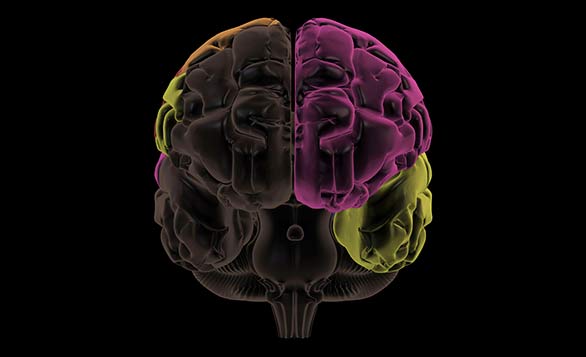
When Roberto D’Angelo and Francesca Fideli discovered that their 10-day-old son, Mario, had suffered a stroke, they were shocked. Maria was unable to control the left side of his body and, to help their son, they opted to participate in a pilot program for mirror neuron rehabilitation. As they explain in the talk
 Roberto D'Angelo + Francesca Fedeli: In our baby's illness, a life lesson
, mirror neuron therapy involved showing Mario objects and demonstrating how to pick them up and use them. As D’Angelo explains, “The theory of mirror neuron says that, in your brain, as you watch me do this, you are activating exactly the same neurons as if you do the actions.”
Roberto D'Angelo + Francesca Fedeli: In our baby's illness, a life lesson
, mirror neuron therapy involved showing Mario objects and demonstrating how to pick them up and use them. As D’Angelo explains, “The theory of mirror neuron says that, in your brain, as you watch me do this, you are activating exactly the same neurons as if you do the actions.”
This therapy led to a discovery: Mario was mirroring his parents’ emotions as much as he was mirroring their physical movements. Their solution: to couple a positive attitude with cutting-edge neurotherapy. Their story culminates with an inspirational message about the importance of positivity and optimism in confronting challenges.
Interested in hearing more about mirror neurons? Below, some resources for further information on the science behind the D’Angelo’s inspiring story.
- Research and writing about mirror neurons has exploded since 2005, when the team of researchers from Italy’s University of Parma made a series of breakthroughs to understand the function of mirror neurons in humans. This article from the American Psychological Association is one of the first to explain the importance of mirror neurons in detail.
. - NOVA’s explanatory video on mirror neurons outlines the basic thinking behind how these cells work. Scientific findings suggest that the neurons that fire in our brain when we are physically performing an action are the same neurons that fire when we observe someone else doing the same action. This explains why we feel pain when watching someone get smacked in the face with a frisbee, or why we feel sad when watching Meryl Streep weigh Sophie’s choice. Mirror neurons raise fascinating questions about learned human behavior.
. - Developing research on mirror neurons brings us one step closer to understanding the way our brains function when processing information and experiencing empathy. This overview of current research from Scientific American provides an update on the current understanding of mirror neurons, and what work still needs to be done.
. - Mirroring People is the first book written in layman’s terms about the incredible science of mirror neurons. Marco Iacoboni, a leading expert in the field, explains the incredible impact that this neurological wiring has on our social interactions and our capacity to understand each other’s emotions. He argues that mirror neurons are central to our basic functionality, and to the shape of our morality, politics and relationships.
. - This conversation between Iacoboni and the Dalai Lama raises fascinating questions. Iacoboni’s sharp scientific mind mixes with the Dalai Lama’s reflections on spirituality to probe into the inner-workings of our mind, body and soul. The conversation explores the human tendency to make bad decisions and engage in negative behaviors, and offers hopeful recourse to address these actions.
. - TED speaker VS Ramachandran is one of the leading researchers on mirror neurons. His talk from TEDIndia 2009 outlines some of the most controversial and radical thinking on the importance of mirror neurons in our individual and human development.
.. - Mirror neurons even play an important role in watching sports. The rush of excitement and adrenaline you feel right after Lionel Messi scores, or the feeling in the pit of your stomach when LeBron’s shot bounces off the rim might be your mirror neurons firing. This article from Grantland offers concrete examples and explanations for some of the most common sensations experienced by sports fans everywhere.
. - And finally, this interview with VS Ramachandran at Berkeley’s Greater Good Science Center updates his work on the connection between empathy and mirror neurons. His cutting-edge research might offer some concrete evidence to support the D’Angelos’ optimistic philosophy.
Comments (24)
Pingback: How Storytelling Makes Your Jokes More Memorable » Chainsaw Communications
Pingback: Lucas Hedges Aura Reading Movie Review – Deeper Perception Made Practical
Pingback: Give Your Love Away! | ♥ artemisia shine
Pingback: Marketing, Reductionism, and Reorganizing Around Experiences, Artifacts, and Conversations | Open Opine
Pingback: Kome još treba informatika u školama? | Netokracija
Pingback: A Rose by Another Name | Pathway through Pain – Journey to Joy
Pingback: The Power of a Heartfelt Compliment to Cultivate Connection and Obliterate Shame -
Pingback: Mirror Neurons | Backyard Books NZ
Pingback: Self through the mirror neurons | Tracing Knowledge ... Στα ίχνη της Γνώσης